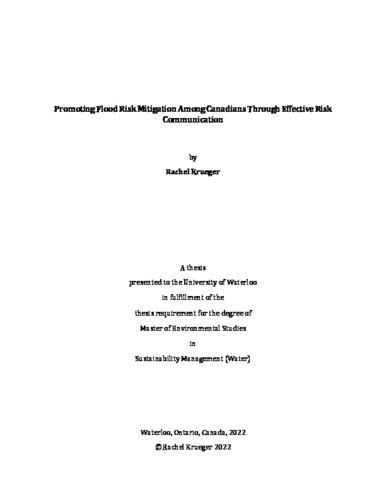| dc.contributor.author | Krueger, Rachel | |
| dc.date.accessioned | 2022-10-04 17:26:57 (GMT) | |
| dc.date.available | 2022-10-04 17:26:57 (GMT) | |
| dc.date.issued | 2022-10-04 | |
| dc.date.submitted | 2022-09-23 | |
| dc.identifier.uri | http://hdl.handle.net/10012/18869 | |
| dc.description.abstract | Amid reports of low levels of flood risk awareness and preparedness among Canadians, risk communication emerges as an important tool for encouraging public participation in flood risk management (FRM) and increasing collective flood resilience. In its most basic form, risk communication informs people of their risk and provides solutions to reduce it. Disaster studies scholars, however, assert that an individual’s decision to take protective action from hazards is mediated by an array of social, economic and cognitive factors. To this end, there are growing calls to incorporate audiences’ social and physical environment as well as insights from behavioural science into risk communication methods to increase their efficacy.
Whether relevant Canadian stakeholders consider those factors in their flood risk communication strategies is unclear, which raises several fundamental questions about flood risk communication in Canada, such as: What are the challenges and opportunities of incorporating risk perception and risk communication theory into flood risk communication practice? Is flood risk communication by key Canadian communicators (e.g., governments, insurance companies, civil society organizations and academic groups) achieving its goals of increasing the knowledge and capacity for flood preparedness of those at risk? If so, how is this assessed? This research aims to provide a comprehensive review of Canadian municipalities’—important flood risk communicators—flood risk communication practices relative to risk communication theory. Surveys of municipal staff from 18 large, flood-prone Canadian municipalities and interviews of 21 subject matter experts concerning household-level flood risk mitigation were conducted and the results were analysed using risk communication and risk perception literature; the latter is grounded in protection motivation theory, a widely-used behavioural framework in flood risk research.
The results indicate that most municipalities’ flood risk communications should theoretically be raising residents’ flood risk awareness and preparedness. Limited time and resources function as the greatest barriers to municipalities’ flood risk communication efforts to the public; such barriers impede some municipalities’ abilities to address known deficiencies in their flood risk communication practices. Public-private and public-public partnerships were identified as critical to overcome municipal resource constraints and to enhance the impact of flood risk education programs and/or flood risk communication messages.
The findings have implications for federal and provincial policies to expand local government responsibility for FRM, because they suggest that such decisions neglect the diversity of local governments with respect to their funding and capacities. Future research recommendations include the further application of evaluation frameworks to flood risk communication activities in light of the finding that Canadian flood risk communicators’ metrics of “successful” flood risk communications are highly variable or altogether absent. In the absence of flood risk communication standards, its impact will remain intangible. | en |
| dc.language.iso | en | en |
| dc.publisher | University of Waterloo | en |
| dc.title | Promoting Flood Risk Mitigation Among Canadians Through Effective Risk Communication | en |
| dc.type | Master Thesis | en |
| dc.pending | false | |
| uws-etd.degree.department | School of Environment, Enterprise and Development | en |
| uws-etd.degree.discipline | Sustainability Management (Water) | en |
| uws-etd.degree.grantor | University of Waterloo | en |
| uws-etd.degree | Master of Environmental Studies | en |
| uws-etd.embargo.terms | 0 | en |
| uws.contributor.advisor | Feltmate, Blair | |
| uws.contributor.affiliation1 | Faculty of Environment | en |
| uws.published.city | Waterloo | en |
| uws.published.country | Canada | en |
| uws.published.province | Ontario | en |
| uws.typeOfResource | Text | en |
| uws.peerReviewStatus | Unreviewed | en |
| uws.scholarLevel | Graduate | en |

